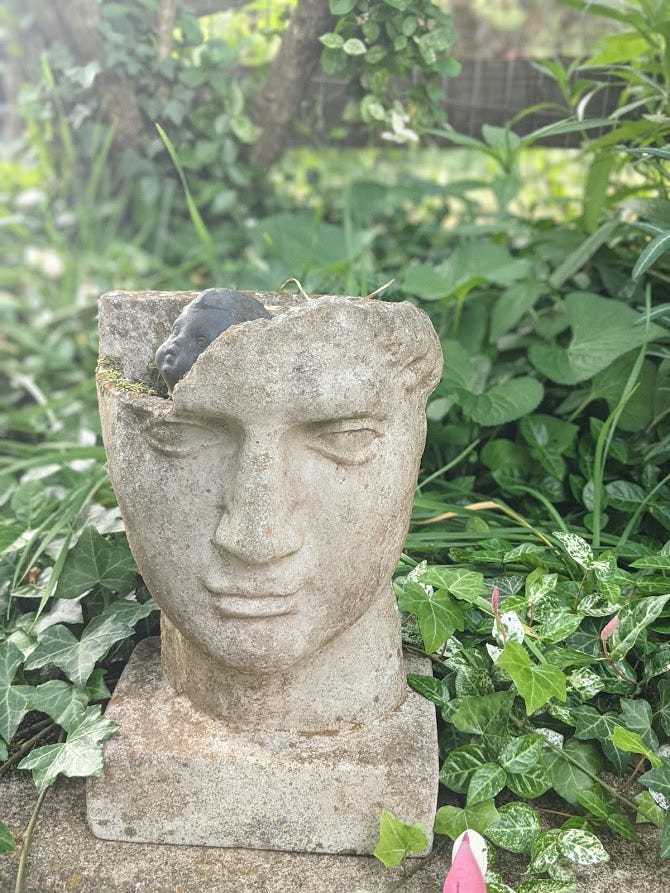

Discover more from Write More, Be Less Careful
I spent the first week of June at The Porches in Virginia, writing a ton and not getting a snack for anyone but me. It was excellent.
One thing that struck me as I talked with other writers there is how hungry so many of us are to learn the magic trick or routine that will finally make writing easier. (Two tidbits I learned: Rebecca Skloot wrote The Immortal Life of Henrietta Lacks from 5.30AM to noon one summer! Kurt Vonnegut claimed to only write for half an hour every day! I’m sure you’ve got other bits of lore floating around in your brain.)
I get it: writing is unbelievably hard sometimes, and it’s easy to believe someone else has figure out how to do it. And I love these stories. I’m a particular sucker for stories about process, like how some novelists make excel sheets to track complex timelines and multiple characters, or Alexander Chee’s advice about drafting longhand then revising as you type. On the podcast I’m a Writer But Rumaan Alam shared that as he was revising Leave the World Behind he printed out the manuscript, sorted it into chapters, then worked to get the chapters to be about the same thickness so he’d be sure he was moving along with the narrative and not getting stuck anywhere.
See! I collect these stories, too, these practices that can easily feel like rules. But here’s the thing: I don’t really believe them. When it comes to writing, and to most things in life, I’m often reminded of the title of a great essay by Tessa Fontaine, Dispatch from the Carnival #1: The Trick is There is No Trick. I first read it when my first baby was new and I was losing my shit, but its lessons have resonated through many hard things:
From the moment it became clear that I needed to learn to eat fire, I’d hoped there was some magic involved that meant you didn’t really have to do the thing it appeared you were doing. Maybe there would be a flame retardant solution I’d spread inside my mouth, like on hotel curtains. Perhaps there was a little machine you wore behind your ear that shot fire-squelching foam onto the flame as it approached your face. Maybe the entire act was an illusion. The most disappointing moment was the revelation that there is no trick. How you eat fire is you eat fire.
How you eat fire is you eat fire. How you write a book is word by word. You can do it at 5AM, or 45 minutes, or #1000words at a time. The trick is there is no trick.
Okay, but let’s not stop there. What I do believe in is figuring out what works for you in this particular moment. What worked for Rebecca Skloot in one magic summer might work for you, or it might not. Instead of looking for someone else’s set of rules or routines, try going deep to think about what you know about yourself as a writer and what you need in your writing life right now.
A few questions to guide you:
What writing practice has worked for you in the past? When you think of a time when you felt good about your writing practice, what elements were in place? Which of those can you return to now?
Is there a particular time of day when your writing brain is at its sharpest? (I believe in Writing First, but I know some people’s brains really get going in the evening.)
What obstacles get in your way? (I do best when my phone’s in another room, and I’ve got a whole bunch of internet blocks set up with LeechBlock, a free browser extension.)
How do you reward yourself for doing your writing? I like to track time and word count, and I jot both in my planner. I’ve also sometimes planned little treats for myself as a reward for finishing a chunk of a project. (I used to buy a bright lipstick when I sent a dissertation chapter to my advisor because it wasn’t super pricy and made me feel cheerful. Cookies work, too. ;) )
But the best tip I know is to stop believing that anyone else has it all figured out. Trust that you know better than anyone how to do your own weird, beautiful work.
A few notes and reading suggestions:
Edan Lepucki is on to something: Don’t Play With Your Kids. Seriously.
I don’t believe in tricks, but I do believe in accountability, and I just joined Keri Bertino’s Writing for Fuck-Ups summer group. Maybe you’d like to join, too?
I’ve long argued that we need narratives about parenthood that push beyond the normative white motherhood memoir, and I’m eagerly waiting for my copy of Krys Malcolm Belc’s The Natural Mother of the Child: A Memoir of Nonbinary Parenthood, which publishes today, to arrive in my mailbox.
I’ve been planning my workshop “Hermit Crabs and the Art of the Nonfiction Essay” at Murphy Writing’s Midsummer Online Writing Getaway, happening in July, and there are still a few spaces available. The full list of workshops is online here. There’s going to be lots of other cool programming, including a session on doodling for writers that I’m looking forward to.
What tricks have you picked up, adopted, rejected, or made your own? I’d love to hear about your writing victories or challenges you’re facing. You can always reply to this email, or find me on twitter (@nancy_reddy) and instagram (@nancy.o.reddy).
Subscribe to Write More, Be Less Careful
why writing is hard & how to do it anyway






